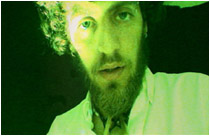



hOur film:
Contact
Email : gustavo@hourfilm.com
More Contact information will be provided
upon release of the DVD
GUSTAVO CANDIA

Biography
Gustavo Candia never found a niche in engineering; the never-ending assignments and laboratory work made it impossible for him to think independently. But he did find aspects of the work very stimulating. A fourth year course offered at McMaster University called "Integrative Engineering" clarified why he had never fully subscribed to the engineering process. The profession follows set rules - rules which were simply suffocating. Candia came to realize that science as a whole is equally governed by variations of said rules. This recognition led him to undertake a comparative investigation between the reductionism of 'engineering' and of a new study Candia was soon to undertake at the Graduate level: the refreshingly holist "History and Philosophy of Science".
Candia’s undergraduate training provided wonderful introductions to scientific theories (Quantum Mechanics, Solid-State Physics and Thermodynamics to name a few), all managing to keep his attention fixed and pondering the possibilities associated with our universe. Still, somewhere along the line, the details began to muddle what was so beautifully artistic about them. And so he turned to film.
"hOur film", Candia’s first and only film to date, begins with a quotation from the natural philosopher Sir Francis Bacon. It reads "The secrets of nature reveal themselves more readily under the vexation of art than when they go their own way." In an attempt to unite science and art, what he has produced is a collage of images and words loosely assembled to draw an analogy between the physics of the universe and that of a camera. The word "loosely" is used since pure scientific subject matter cannot be artistically rendered. How many films about science have been made for the general public?
"hOur film" tries to do everything and accomplishes practically nothing - and that's why Candia has gone and made it. Science tells us that to err gives one the opportunity to learn something. And yet art echoes not far behind, since for it, there's no such thing as wrong; there's only CREATE.
What matters is that he has tried - and he will certainly try again.